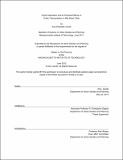| dc.contributor.advisor | P. Christopher Zegras. | en_US |
| dc.contributor.author | Jacobi, Amy Elizabeth | en_US |
| dc.contributor.other | Massachusetts Institute of Technology. Dept. of Urban Studies and Planning. | en_US |
| dc.date.accessioned | 2012-10-10T14:54:25Z | |
| dc.date.available | 2012-10-10T14:54:25Z | |
| dc.date.issued | 2012 | en_US |
| dc.identifier.uri | http://hdl.handle.net/1721.1/73704 | |
| dc.description | Thesis (M.C.P.)--Massachusetts Institute of Technology, Dept. of Urban Studies and Planning, 2012. | en_US |
| dc.description | This electronic version was submitted by the student author. The certified thesis is available in the Institute Archives and Special Collections. | en_US |
| dc.description | "June 2012." Cataloged from student submitted PDF version of thesis. | en_US |
| dc.description | Includes bibliographical references (p. 89-90). | en_US |
| dc.description.abstract | The current fiscally conservative climate on Capitol Hill, as the next surface transportation bill is being negotiated, may possibly carry over to a greater dependence on fiscal federalism for funding public transportation. With local governments already straining their resources, an examination of how a greater reliance on local funds for public transit is a prudent topic. This thesis focuses on expenditures (both total and operating) by public transit systems in four mid-sized US cities and their revenue sources between 2005 and 2010 in order to ascertain if systems that are more reliant on local revenues for their expenditures are more cost effective, more cost efficient, and more service effective than their peers. It also examines the local revenue sources and whether systems that are more heavily reliant on local funds use a more diverse set of revenue generation tools. This thesis uses a multiple case study approach in order to examine the trends in expenditures and revenue sources by four bus and demand response public transportation systems in Alabama, Oklahoma and Nebraska. The findings of this thesis, while not generalizable to all transit systems in mid-sized cities, indicate that systems that are the most reliant on local revenues are not necessarily the most cost efficient, perhaps because the burden of financial responsibility is too large for the system to effectively handle. Trends also indicate that systems that have heavier reliance on local funds generate their revenues through a more diverse set of sources than their peers. | en_US |
| dc.description.statementofresponsibility | by Amy Elizabeth Jacobi. | en_US |
| dc.format.extent | 90 p. | en_US |
| dc.language.iso | eng | en_US |
| dc.publisher | Massachusetts Institute of Technology | en_US |
| dc.rights | M.I.T. theses are protected by
copyright. They may be viewed from this source for any purpose, but
reproduction or distribution in any format is prohibited without written
permission. See provided URL for inquiries about permission. | en_US |
| dc.rights.uri | http://dspace.mit.edu/handle/1721.1/7582 | en_US |
| dc.subject | Urban Studies and Planning. | en_US |
| dc.title | Fiscal federalism and its potential effects on public transportation in mid-sized cities | en_US |
| dc.type | Thesis | en_US |
| dc.description.degree | M.C.P. | en_US |
| dc.contributor.department | Massachusetts Institute of Technology. Department of Urban Studies and Planning | |
| dc.identifier.oclc | 811338192 | en_US |
